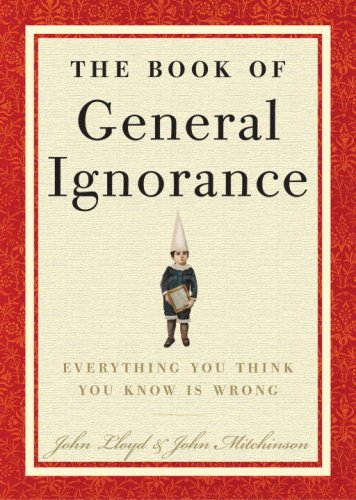Books |
The Book of General Ignorance
John Lloyd & John Mitchinson
By
Published: May 03, 2021
Category:
Non Fiction
Stupidity. It’s the word of the year, every year now, it seems.
Somebody — I won’t type the name — spent years saying that you really don’t need to know much to do a sophisticated, complicated job because all jobs boil down to trusting your gut.
That’s ignorant. And yet many people preferred that view.
You and I are not those people. We like smart. We are smart.
How smart? Answer these questions:
How long can a chicken live without its head?
What do chameleons do?
Who invented champagne?
How many legs does a centipede have?
How many toes has a two-toed sloth?
How many penises does a European earwig have?
Which animals are the best-endowed of all?
What is a rhino’s horn made from?
Who was the first American president?
What were George Washington’s false teeth made from?
What is the tallest mountain in the world?
What is the most dangerous animal that has ever lived?
What man-made objects are visible from the moon?
Who invented the telephone?
The answers? Not what you think. You can Google the questions for the right answers — or, because you are smart, you can get your mitts on a copy of “The Book of General Ignorance.” [To buy the book from Amazon, click here. For the Kindle edition, click here.]
Where does this book come from? England. Of course. It started with a TV show: “Quite Interesting” (or QI, as it was known across the pond).
QI is smart TV. It does not shrink from the designation “intellectual British panel game,” which may explain why, despite its roaring success, no American network is rushing to import it. For many years, the host was Stephen Fry, a large, funny, educated chap who was once half of Hugh Laurie and has a bit of Oscar Wilde about him. [The significant difference, of course, is that Fry sees nothing wrong about openly declaring his homosexuality and delivering such bon mots as “I suppose it all began when I came out of the womb. I looked back up at my mother and thought to myself, ‘That’s the last time I’m coming out of one of those.'”]
The idea of the show — well, it’s complicated, and no one connected to the enterprise can figure out the scoring, but the general idea is that everything you think you know is wrong.
Like: the facts. The ones you know. Moths are attracted to flames, yes? A whale could have swallowed Jonah, right? Chameleons change color, do they not? And camels — water’s in the humps. The planet’s mostly water. An American invented baseball. Blackboard chalk is chalk.
Don’t bet on any of that.
Flushed with intellectual superiority, John Lloyd, the show’s creator and producer, and his head researcher, John Mitchinson, decided to go beyond television and do what all respectable Brits do at some point in their lives — put out a book. Their purpose: provide a Real Service in a know-it-all-world. As they write:
We live, they say, in The Information Age, yet almost none of the information we think we possess is true. Eskimos do not rub noses. The rickshaw was invented by an American. Joan of Arc was not French. Lenin was not Russian. The world is not solid, it is made of empty space and energy, and neither haggis, whisky, porridge, clan tartans nor kilts are Scottish.
So we stand, silent, on a peak in Darien: a vast, rolling, teeming, untrodden territory before us. QI country.
In this endlessly amusing and far too informative book, you will unlearn many lies that you have been told were bedrock truths. You will learn how to read questions carefully, the better to find the tricks. [Hey, they’re Brits.] You will smarten up. You will develop the proper skepticism about the “knowledge” we think we know.
And you’ll become that annoyingly smart person — the word I’m looking for is, I think, smartass — at parties.
An invaluable book. It belongs in every smart person’s library. And makes a great gift for people who think they know everything — the stupids.


